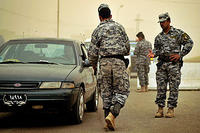-
Three of Dzhokhar’s friends charged with destroying evidence (Updated)

Three college students have been arrested on suspicion that they helped Dzhokhar Tsarnaev destroy evidence which would have provided details about his and his brother’s preparations for the marathon bombing. One of the three then lied to police when asked about their actions. The three are likely to face charges of conspiracy to obstruct justice. One of three will also be charged with lying to federal investigators.
-
-
GAO investigates DHS ammo purchases

DHS is again facing questions about the department’s large ammunition purchases, at the same time that a bill is being introduced which would limit the amount of ammo a government agency can legally buy.
-
-
Preserving biological evidence
A new NIST/NIJ handbook provides forensic laboratories, law enforcement agencies, and the judicial system with state-of-the-art guidelines and recommended best practices for preserving biological evidence so that it is available at any time to solve “cold cases,” confirm the guilt of criminals or exonerate the innocent.
-
-
Central Washington State proposed for a UAV research and testing site
The FAA Modernization and Reform Act of 2012 enacted by Congress calls for establishing six unmanned aircraft system research and testing sites in the United States. A consortium of Washington State-based organizations will soon submit the final section of a proposal to site an unmanned aircraft system research and testing facility in central Washington. If successful, the proposal to the Federal Aviation Administration (FAA) will result in the FAA naming the Pacific Northwest Unmanned Aerial Systems Flight Center as one of six U.S. testing facilities later this year.
-
-
Seeking new ideas for mobile ad hoc networks (MANETs)
Troops operating in forward locations without telecommunication infrastructure often rely on a mobile ad hoc network (MANET) to communicate and share data. A constraint with current MANETs is they can only scale to around fifty nodes before network services become ineffective. DARPA is exploring new technologies unencumbered by Internet Protocols (IP) which could be the key to enabling large MANETs. The Internet facilitated far-reaching technical advances, but in this technology area the Internet may be the roadblock.
-
-
Kenya police: (fake) bomb detectors work, making Kenyans safer

A British businessman was convicted of selling Iraq and Afghanistan fake bomb detectors – the two countries used millions of dollars in U.S. aid money to purchase the sham devices (the devices were, in fact, $20 golf ball finders which the businessman sold for $40,000 each). The police in Kenya purchased twenty-six of the sham detectors, but Nairobi police chief says the devices work, and that Kenya is safer for them.
-
-
Female DNA found on Boston bomb fragments
FBI investigators found female DNA on fragments from the bombs used in the Marathon attack. The finding was first reported in the Wall Street Journal. Mikhail Allakhrdov, a man who some of Tsarnaev’s family members and friends described as the mysterious “Misha” who radicalized Tamerlan, said that he had not been in contact with Tsarnaev for several years, and that he never encouraged him to take up violence. Allakhrdov, a Ukrainian Christian who converted to Islam, admitted that a few years ago he was Tsarnaev’s “spiritual tutor.”
-
-
Assessing security at schools, houses of worship
The Office of Infrastructure Protection of DHS National Protection and Programs Directorate will be conducting a virtual roundtable on the topic of “Conducting Security Assessments: A Guide for Schools and Houses of Worship.”
-
-
U.K. businessman convicted of selling fake explosives detectors

James McCormick, a British businessman, was convicted of having made millions in profits from selling fake bomb detectors to Iraq, Georgia, and several other countries. McCormick bought $20 golf ball finders in the United States, then sold the devices, which had no working electronics, for $40,000 each. The Iraqi government used more than $40 million in U.S. aid money to buy 6,000 of the devices, despite being warned by the U.S. military that the devices were a sham. The Iraqi military used the fake detectors at check-points, leading to scores of soldiers and civilians being killed by suicide trucks which went through the check points undetected. The police in Kenya says it will continue to use the devices.
-
-
California considering lead ammo ban

Health and environmental advocates are trying to make California the first state to enforce a statewide ban on the use of lead bullets for hunting. The U.S. Geological Survey (USGS) estimates that there are 400,000 pieces of lead shot per acre in wild game territory which can be eaten or washed into rivers and waterways. The USGS also says that 60,000 metric tons of lead fired off last year is the second largest use of lead in the United States behind batteries. The CDC reports that lead is so abundant in meat harvested through hunting, that pregnant woman and children should never eat it. The NRA opposes the ban, saying it could possibly the end of hunting in California.
-
-
FBI looking for a “person of interest” who may have helped the Tsanaev brothers
Lawmakers with knowledge of the investigation into the Boston marathon bombing said over the weekend that law enforcement agencies are looking for a “person of interest” who may have been involved with the Tsarnaev brothers in preparing the attack. The lawmakers highlighted the fact that law enforcement agencies are not convinced that the brothers acted alone, without any help of one or two more people.
-
-
Lawmakers renew effort to reach bipartisan gun control compromise
Lawmakers have quietly begun discussions over gun control measures, with a bi-partisan group of senators trying to come up with a compromise to solve the differences that led to the failure two weeks ago of a comprehensive overhaul effort.
-
-
Jewish Security Summit discusses communal safety
Leaders from the Jewish Federations of North America (JFNA) and other Jewish organizations gathered last week at the first Jewish Communal Security Summit in New York to strategize with top experts in the field how best to keep the community safe.Security providers from around the country had a chance to learn about best practices in threat assessment and response in the current climate.
-
-
Smartphone app locates gunfire source

For the last decade, the Department of Defense has spent millions of dollars to develop sophisticated sniper location systems which are installed in military vehicles and require dedicated sensor arrays. Scientists have now developed a smartphone app that tracks gunfire and points in the direction the shot came from.
-
-
New fertilizer can be used to grow food – but not build bombs

Ammonium nitrate fertilizer is used in agriculture, but when mixed with a fuel such as diesel, it is highly explosive. It was used in about 65 percent of the 16,300 homemade IEDs in Afghanistan in 2012.About 1,900 troops were killed or wounded in IED attacks in 2012, 60 percent of American combat casualties. There have been more than 17,000 global IED incidents in 123 countries in the past two years. Timothy McVeigh used ammonium nitrate in Oklahoma City in 1995. Scientists have developed a fertilizer that helps plants grow but cannot detonate a bomb.
-
More headlines
The long view
Why Ukraine’s AI Drones Aren’t a Breakthrough Yet
Machine vision, a form of AI, allows drones to identify and strike targets autonomously. The drones can’t be jammed, and they don’t need continuous monitoring by operators. Despite early hopes, the technology has not yet become a game-changing feature of Ukraine’s battlefield drones. But its time will come.
